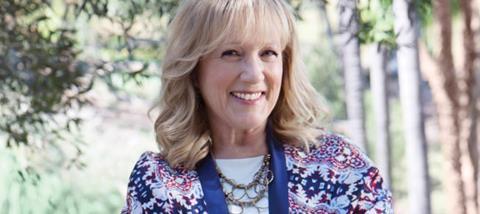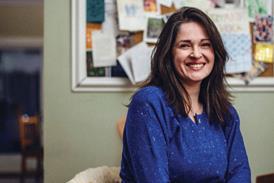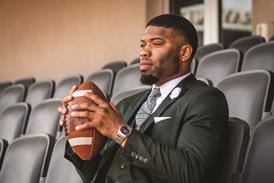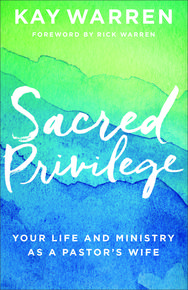
Kay Warren is an international speaker, Bible teacher and best-selling author. But to many, she is best known as the wife of one of the most widely recognised pastors in America, Rick Warren (author of The Purpose Driven Life which has sold more than 50 million copies worldwide), with whom she co-founded the Californian megachurch, Saddleback.
Yet Kay doesn’t live in the shadow of her pastor husband. For more than ten years she has also been an advocate for those living with mental illness, HIV and AIDS (and those orphaned), and is a board member of America’s National Action Alliance for Suicide Prevention. Recently, Kay has also been using her platform to be open and honest about holding on to faith whatever life brings.
I’m a pastor’s wife too, and am aware of the expectations of the ‘perfect-happy-family’ that a public ministry role can bring with it. So, when I sat down to interview Kay, what resonated most was her passion for honesty and authenticity in ministry. Kay has spoken openly about family life when their youngest child, Matthew, was suffering from mental health issues – and has bravely shared how they are continuing to deal with the overwhelming grief of losing him to suicide in 2013. In Choose Joy: Because Happiness Isn’t Enough (Revell), she covered other painful experiences in her own life, including cancer and depression.
Kay’s latest book, Sacred Privilege: Your Life and Ministry as a Pastor’s Wife (Revell), is just as honest – almost brutally so at times. It’s ultimately a hope-filled account of her life, championing pastors’ wives to be themselves. But it is the honesty that makes the book so powerful. It’s unusual for someone so high-profile to be so frank, which will be an encouragement to many, whether they are ‘married to the ministry’ or not.
You grew up as a pastor’s kid. Did you feel a weight of expectation upon you; that you had to behave in a certain way all the time?
Oh, definitely, yes. I felt that pressure to be perfect, at a time in which pastors and their families didn’t talk about their struggles; didn’t talk about anything wrong. We had to present this face at church. I remember feeling: “I am in trouble either way – there are things that I’m expected to do because I’m the pastor’s daughter, and there are things I’m forbidden to do because I’m the pastor’s daughter.”
I was a very sensitive child, and grew up wanting other people’s approval. It didn’t take long for a strong perfectionism to develop in me, and I didn’t have a lot of room for grace in my faith. I was pretty legalistic; I was in a very conservative denomination, and there were a lot of things that were forbidden to us. And yet I knew that there were internal struggles from a pretty young age – I had a porn fascination…
Some people might be shocked that you’ve included such details, but you feel it was important to be honest about your background?
I do, because anything we keep as a secret develops power over us. And it perpetuates a cycle of shame and guilt. Growing up in the home that I did, I obviously knew that pornography was not a good thing. But I also have to say that we’re talking the 1960s, and porn was not readily available. It’s not like today where it’s at your fingertips 24/7 in every area that you can think of. So I came upon it in a limited fashion but, when I did, it had a hold on me. The enemy takes those kinds of secret places in us, and beats us with them.
I was molested as a small child; it created a lot of confusion about sex...then my normal developing curiosity about sex got hooked around pornography. And yet with all of my heart I loved Jesus. But there were secrets and habits that I felt too ashamed to talk about, and I didn’t know how to break them. I have great empathy for anyone who is living in that cycle of sin-deceit-shame remorse. When we say, “Hey, I’m just like you and I have found freedom, and I pray for that freedom for you”, it gives hope.
You took your brokenness into your marriage to Rick. Could you describe what those early days were like?
One of the details of our story is we just didn’t know each other well. We had one of those ‘biblical courtships’, where God said to Rick, “You’re going to marry her”, and Rick said, “OK.” God said to me, “You’re going to marry that guy”, and I’m like, “OK.” We were separated a lot of that time [their engagement]; he was in Japan, and then another part of the States. And it was the days before cell phones and computers, and we were both poor, so we relied on writing letters. So we just didn’t know each other when we got married.
Neither of us recognised how I had been shaped by being molested as a child, and Rick certainly didn’t know that I had a fascination with pornography. So when we got married, nothing worked. We didn’t know how to communicate, and we fought about everything. We fought about money; we fought about sex – because sex didn’t work. We were both virgins, and we bought into the myth that if you are a virgin, then automatically you’re going to have a great sex life. We were so disappointed. We fought about our inlaws; we fought about when to have kids. And then we fought about how we communicated, which we didn’t know how to do.
Rick was a youth pastor at the time; we didn’t feel like we could tell our senior pastor our struggles. It just was so miserable, and we both began to fall apart emotionally. Rick got physically sick from depression, and was hospitalised because he couldn’t function; he was fainting. I remember sobbing constantly, thinking: “This is not the way I thought life was going to be; this is not the way I thought marriage was going to be.” We just kept thinking it was our fault – that we were bad Christians…
So how did you get to the point of asking for help?
I think that the pain exceeded our shame. The pain of a broken relationship; the pain of our sexual relationship being nonexistent. And the pain of thinking we were going to live the rest of our lives like this. There was a Christian counsellor attached to our college, and we started seeing him. We realised that we weren’t the utter failures that we thought we were; that other young couples had similar problems. He began teaching us how to communicate. Over the years we have gone to counselling many times. I am a complete believer in Christian counselling; it has saved our marriage.
What would you say is the most important factor in you and Rick staying the course in your marriage?
We made a promise that we were going to stay together, and that we were going to reflect the glory of God. Even though we didn’t know how to do that, we could never move away from that vow. You can’t save your marriage alone. If both of us had not been committed to that, we would not be together today. So I mean no judgement towards anyone who has gone through a divorce.
Throughout the years, when we would have difficulties and arguments, and our children [asked]: “mummy, are you and daddy going to get a divorce?” I would say: “no, we are not. We will always work this out. We have made a promise to God, and we make a promise to you – we will always work this out.”
I can’t count the number of times that we would be so frustrated with each other – because Rick and I are polar opposites in just about every way you can think of – we’d get in an argument about something, and inside would be going: “Argh, this is so hard, I do not want to be married to you – you are driving me crazy!” And then the picture would come in my mind: could I really go and look my children in the face and say, “You know how I told you that Daddy and I were always going to stay together? Well, sorry; we can’t do that.” And I couldn’t bear it.
In your book you also talk about how, if you’re in ministry, your kids need to have that sense of owning the dream as well. How did you learn to do that in practice?
While I really feel like a husband and wife need to have a shared vision together for ministry, it’s a little harder to make that happen in your children’s lives. You can simply create an environment in your home that hopefully makes it easier for them to feel that similar passion, or at least an understanding of what it is their mum and dad are doing.
It really is up to us as parents to create a stable, loving, grace-filled home. Where children understand there are second chances.
Our primary job is not to instil the ten most basic, systematic theology points. While that’s important, what’s most important is that children know – through the way we love them – that God loves them.
We need to live a life of integrity before them. If they grow up in a family in which there is a huge disconnect between the way mum and dad act at church and the way mum and dad act at home, we cannot expect that our kids will love God or want to be part of a church.
Your youngest son, Matthew, had significant mental health issues. How did you walk those difficult years with him, and support and validate him?
We tried always to tell our kids: “We do what we do because we think this is what it means to follow Jesus; not because of what your dad does as a profession.” And so that set up an expectation of “We’re not doing something for what other people think; we’re doing it because this is how we think we can please God.”
When it came to Matthew, we were fortunate, because Saddleback is a really loving place. Sunday school teachers and youth workers didn’t treat him differently, they didn’t make him feel bad about living with mental illness; they just came along to support him. And I think that’s crucial, that kids really know that no matter what it is they’re struggling with, we’re going to love them and accept them, and that we do our best to put them around other adults who have that same view.
How have you learned to deal with those really difficult life experiences, such as cancer and Matthew’s suicide, especially with the lack of privacy?
I’m not afraid to seek privacy. Particularly when Matthew died…we didn’t go to church for four months. We were so broken and devastated we stayed at home, and learned slowly how to begin to live again. And when we did come back to church, and more actively into ministry, we really tried to give ourselves a lot of grace. I didn’t feel like I owed anyone any explanation for why we were so devastated. If they didn’t understand, they just didn’t understand, and we were going to do what we needed to do to heal and begin to live again.
Matthew lived with mental illness, and he fought as long and hard as he could. He lived a tortured life, and mental illness got the best of him. There’s no shame in illness. And so we weren’t going to be ashamed, and we were going to do our best to help others break through the shame that they were experiencing, if they had a loss to suicide. We decided that we were going to let the message of Matthew’s death be that there is always hope, and that the Church needs to be that place of hope.
I’m aware that we don’t do grieving and lament well in church…
You are 100 per cent right – most Christians don’t do grief well; most people don’t do grief well. Years ago people wore a black armband, or they wore black clothes, for a year – their houses were draped with black fabric. We’ve got rid of all of those external signs. That makes it much harder to deal with grief, because people say in their minds, “Well, OK, you’ve had the funeral – you’ve had the memorial service – and now you have to kind of go on.”
When you’ve lost someone dear to you, you don’t just go on. Even if other people expect that you are or that you should, you can’t. And it’s not even right to do that. Grief is a normal process, and grief is a gift from God to help us get through the lashes of our lives. We decided that we were going to do our best to model for others how to grieve: how to experience deep sadness and loss; trust God; worship God; find beauty in life again.
How have you learned to live a balanced life, with those “unforced rhythms of grace”? (Matthew 11:28-30, The Message)
Life comes to us in seasons. We would prefer to just ignore that, and think that life is all one seamless piece. But it’s not. Wise people recognise that there are limitations and opportunities in every season. I’ve chosen to live my life based on the season that I’m in at any given time. It helps me in that rhythm; it helps that ebb and flow. That this season is intense, the next one may be less so. Take the limitations, and make the most of the opportunities.
Hear the interview in full on Premier Christian Radio on Saturday 3 February at 4pm. Or download the podcast premierchristianradio.com/theprofile
Sacred Privilege (Revell) by Kay Warren is out now


































